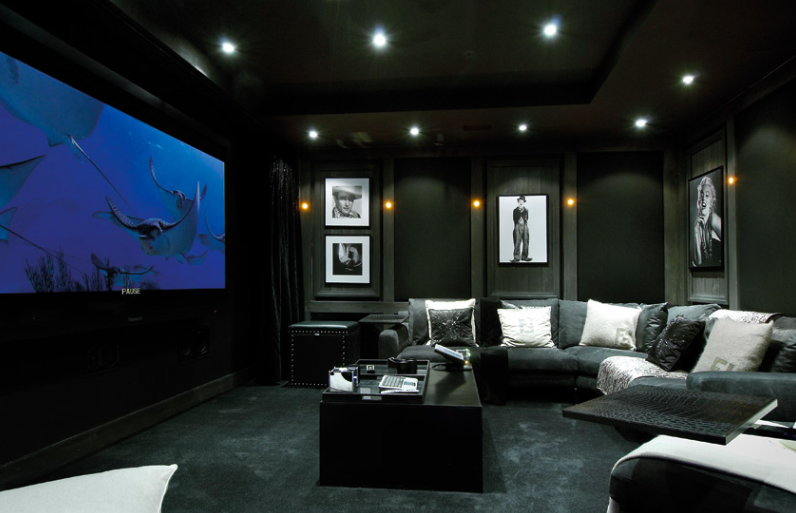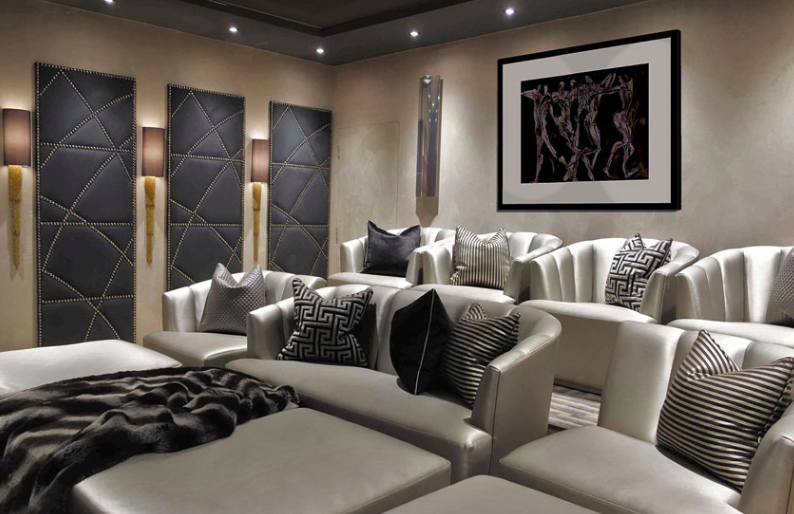HOW TO DESIGN YOUR OWN HOME CINEMA ROOM
Recreate the ultimate movie experience in the comfort of your own home
DESIGNING THE RIGHT HOME CINEMA SETUP
LuxDeco.com - Home cinema ideas begin with finding the right space in your home. Smaller rooms that are ideally set back from the ‘high traffic’ downstairs areas generally work best so that it fits in with the rhythm of everyday life. If you have a boxier room with little natural light (like this one, above, by René Dekker), this will lend itself perfectly to being a home cinema; it’s the one room where natural light is a burden instead of a benefit. Most interior designers will say that the smaller the space, the easier it is to produce effective acoustics without having to spend large amounts on sound panels, extensive surround sound systems and anti-reverberation equipment. Choosing to have carpeted floors over wooden flooring and textile wall coverings or padded wall paneling will help with this too, because they all absorb the sound instead of causing an echo. Small, low ceilings, little light – three aspects that are actually welcomed in a cinema room.
Space settled, one of the key areas to look into when designing your home cinema is the electrical setup. If you aren’t working with an interior designer, it’s wise to bring in an electrician at the start of your project to consult them on how and where to fit all of your electrical appliances. Ideally, everything will be pre-wired so that they meld into the architecture of the room – this will reduce the amount of trailing wires too. In addition to your sizeable screen (whether it’s a television screen or a projector screen), you’re likely to want surround sound and various power outlets so that you’re not needing to add in electrical work post-decorating. A home cinema needs the input of experts in technical equipment and installation to be sure that it will function as it needs to.
And regarding colour palettes, cinema rooms thrive when the tones you use are dark and moody. Because the light is going to be kept down low and all eyes will be on the screen, you can afford to be a bit braver with the colours you use too. It might be that this is the room that you finally try applying the same inky colour on the walls to your ceiling or you go for the heavily patterned and textured wallpaper that you were concerned might overwhelm other rooms in your home. A cinema room is a space to be daring and to experiment with your dark side.
HOW TO CHOOSE THE PERFECT LIGHTING FOR YOUR HOME CINEMA ROOM
Most movie experiences don’t feature glaring lights, and neither should your own home cinema room. This really isn’t a multi-tasking space, and so it’s a rare instance where you don’t need to cater for scenario X, Y and Z, like in a kitchen where you need task-style, atmospheric and background lighting. All that will be happening in your media room is lots of film watching and relaxing. This therefore means that when considering how to light the cinema room in your house, concentrate more on ultra-soft, ambient light. Shorter table lamps keep the lighting level low so it’s not detracting from your home cinema screen. Seek out shades that throw the light downwards rather than at an angle – you might like to opt for a shade made from a heavier textile so that the light diffuses more subtly, like wool or heavy linen, or a patterned shade. It’s also wise to avoid glossy lamp stands such as chrome or polished brass as they pick up on the light and bounce it around the room – a distraction that’s not well-placed in a cinema room. Some home cinemas use LED strip lighting recessed into the skirting board or ceiling alcoves or spotlights, but both of these can feel too akin to an actual cinema. The difference here is you want it to feel like a home first and foremost, so try not to be tempted to include lighting that feels out of sync with your home’s personality.
GET COMFY ON A CINEMA ROOM-STYLE SOFA
Aside from the screen, the second most important part of your home cinema setup is the seating. The best cinema-style sofa will give you all of the things that cross your mind when you’re visiting an actual cinema – enough depth to comfortably stretch out, high enough comfort for you to want to curl up and settle down for a feature length film, and plenty of room rather than being confined to one seat per person.
One of the most popular cinema room settees has to be the L-shaped sofa. They give you the opportunity to fit plenty of people around the screen, or for just one or two of you to share and stretch out. It feels almost as good as being in bed. Similarly, modular corner sofas are impeccably placed for a home cinema, even in a small cinema room. They give the comfort and depth levels necessary for a rainy afternoon of back-to-back film-watching and means that you can make it as large or as small as your room allows.
But if corner and L-shaped sofas aren’t for you, just be sure to pick a sofa that’s got a generous seat depth. An ottoman or couple of pouffes in front of any cinema room seating provides you with even more opportunity to stretch out – nobody wants lack of legroom in their own home. And comforting touches like blankets to hand and an abundance of cushions are a given.
INDULGE IN HOLLYWOOD GLAMOUR STYLE CINEMA ROOM DECOR
The interior design side to your home cinema room ideas is, like with any part of your house, entirely personal. But, if there’s one space where you can really afford to indulge in a dose of glamour, it’s here. There’s something about cinema rooms that have an retro, silver screen dimension to their character, so think about designing your scheme around the bygone Hollywood era. Or at least having the occasional nod to it.
An Art Deco-style bar cart in the corner is an easy yet playful touch that will make your cinema experience feel more luxurious – try Ralph Lauren’s range of cocktail essentials to top it off. Upholstery in velvet (red for the ultimate depiction of Hollywood glamour) with a touch of fringing here and there, be it on a sofa’s bottom edge or a vintage lampshade is where you begin to add the decadence. Curtains were then, and are now still, commonplace in a cinema, helping with acoustic absorption, noise reduction and to block out any light creeping in. Choose velvet for a traditional take on the home cinema design or linen, nubuck suede or even supple, aged leathers for a more contemporary look.
Hollywood’s Golden Age is known for its glitz and the cinemas of the 1930s were often highly ornate so don’t shy away from decorative touches like sculptures or even works of art that will help you to reference this, such as Eichholtz’s monochromatic of Old Hollywood heartthrobs like Humphrey Bogart and Sean Connery.
If somebody enters your cinema room and feels just a hint of Charlie Chaplin, Marilyn Monroe or Fred Astaire, then you’ll have achieved the intended effect. - Blog post courtesy of LuxDeco.com




